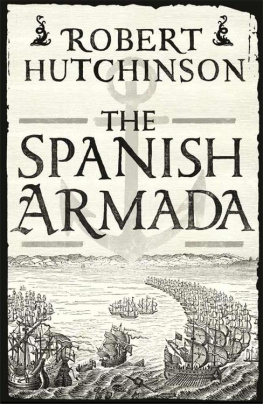as the waves of the sea, without stay, do one rise and overtake another, so the Pope and his ministers be never at rest, but as fast as one enterprise faileth they take another in hand hoping at last to prevail. Sir Walter Mildmay MP, October 1586
A RMADA YEAR, 1588, swept in on a flood tide of historical prophecies and dire predictions. For the numerologists, who divided the Christian calendar into vast, looping cycles of time, constructed in multiples of seven and ten and based on the Revelation of St John and the bloodier parts of the Book of Isaiah, the year offered nothing less than the opening of the Seventh Seal, the overthrow of Antichrist and the sounding of the trumpets for the Last Judgement.
For the fifteenth century mathematician Regiomontanus, although he had not been quite so specific about the years unfolding, still the promise of a solar eclipse in February, and not one but two lunar eclipses in March and August had not, he had thought, augured well.
The printers of Amsterdam rang in the year with a special edition of their annual almanac, detailing in lurid prose the coming disasters: tempests and floods, midsummer snowstorms, darkness at midday, rain clouds of blood, monstrous births, and strange convulsions of the earth. On a more positive note, they suggested that things would calm down a bit after August and that late autumn might even be lucky for some, but this was not a January horoscope many read with pleasure.
In Spain and Portugal the sailors assembling along the western seaboard talked of little else, no matter that their King, His Most Catholic Majesty Philip II of Spain, regarded all attempts to divine the future as impious. In Lisbon a fortune-teller was arrested for making false and discouraging predictions, but the arrest came too late: the year had already begun with a flurry of naval desertions. In the Basque ports Philips recruiting drive slowed and halted because of many strange and frightening portents that are rumoured.
In Rome it was brought to the attention of Pope Sixtus V that a recent earth tremor in England had just disgorged an ancient marble slab, concealed for centuries beneath the crypt of Glastonbury Abbey, on which were written in letters of fire the opening words of Regiomontanus prediction. It was felt by the papal agent who delivered this report that the mathematician could not, therefore, be the original author of the verses and that the prophecy could stem from one source only: from the magician Merlin. It was the first hint that God might be on the side of the English.
But in England no one mentioned Merlins intervention in international affairs and the English almanacs that year were strangely muted affairs, proffering the general observation that Here and in the quarters following might be noted manystrange events to happen which purposely are omitted in good consideration. With their fellow printers in Amsterdam working round the clock to meet the publics demand for gruesome predictions, it seems odd the English press were grown so coy, particularly when the editor of Holinsheds Chronicles had written the year before that Regiomontanus prophecy was rife in every mans mouth. But it was not in the Governments interest that England should be flooded with stories of death and destruction, for it was all too likely that any day now it would be visited by the real thing.
For some four years now England and Spain had been at war: an undeclared phoney war, fought at third hand, on the battlefields of the Low Countries and up and down the Spanish Main, by mercenaries and privateers, most notably the merry, careful Francis Drake. Drakes raid on the port of Cadiz in April 1587 had cost Spain some thirty ships and had bought England a twelvemonth reprieve. But all this did was to postpone the inevitable until the fateful year 1588, because the Spanish were coming, with the mightiest fleet that had ever been amassed. Sixty-five galleons like floating castles, many-oared galleys, cargo-carrying urcas, nimble pataches and zabras, all these had been assembling in the west-coast ports of the Iberian peninsula since 1586. Together they could hold some thirty thousand men, numerous cavalry horses and pack animals and all the many carefully counted barrels of food and water needed to sustain a force of such size. The normally tight-fisted Pope Sixtus When it comes to getting money out of him, it is like squeezing his life blood, wrote the Spanish ambassador Olivares to King Philip had swallowed his respect for the English Queen, Elizabeth I, and signed a treaty with Spain, promising a million gold ducats (about 250,000) to Philip shouldhe manage to conquer England, so long as the next English ruler, a position on which Philip had designs himself, returned the country to Catholicism.
Ranged against England were the combined forces of Spain, Portugal, the Italian States, and the Spanish Netherlands, with France, though as yet undecided, also likely to join the Catholic crusade. The English troops, in comparison with Spains professional, battle-hardened soldiers, were an ill-trained rabble of amateur militiamen, drafted into service at county-wide musters and required to pay for their own gunpowder for the duration of combat. The officers were no better. Most refused to take orders from anyone lower in social standing than themselves. Had it not been for the remodelling of the Queens Navy by Drakes fellow sea-dog, John Hawkins, the outcome of the Armada conflict might well have been very different. Still, Hawkinss fleet of twenty-three warships and eighteen smaller pinnaces was heavily outnumberedby the massive, some hundred-and-thirty-strong Spanish and Portuguese Navy. And his belief that the success of Elizabeths ships lay in long-range gunnery rather than traditional short-range grappling was not helped by those English gunmakers still busily selling cannons to the Spanish as late as 1587.
So at the beginning of 1588 the odds on the Deity being a Spaniard were temptingly short. Pray to God, wrote one member of the Armada force, that in England he doth give me a house of some very rich merchant, where I may place my ensign. Indeed, for all those about to embark with the Armada, England was a place of lucrative spoils and members of the fleet were delighted by how easy it was to obtain credit on the eve of sailing. Many spent their money on fine clothes for the occasion and one returning Englishman reported that the soldiers and gentlemen that come on this voyage are very richly appointed. If the hard-headed bankers of Europe were putting their money on an easy victory for Spain, it was small wonder that in December 1587 a false rumour that the Spanish were coming sent the population of Englands coastal towns flying inland for protection.
As May 1588 gave way to a blustery June, a cargo ship under Captain Hans Limburger made its way slowly north from Cadiz, bound for the Hanseatic port of Hamburg. At Cape Espichel, just south of Lisbon, Limburger saw a sight that stunned him. Although Spains preparations were no secret to anyone in Europe, nothing had prepared the German captain for this. For one whole day Limburgers ship beat slowly past the assembled Spanish fleet, the ocean groaning under the weight of them. At Plymouth Limburger was able to give the port authorities the confirmation they needed: the Armada was under sail and on its way.










